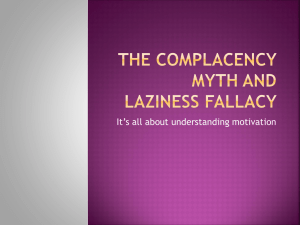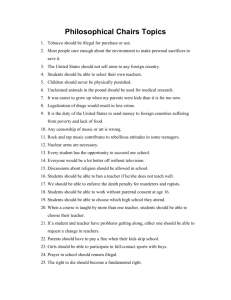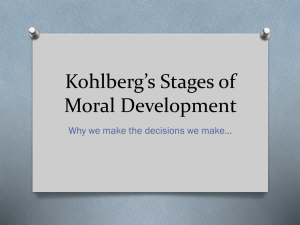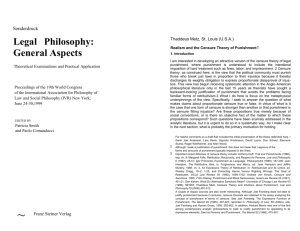A. Lee, `Legal Punishment, Censure and Hard
advertisement
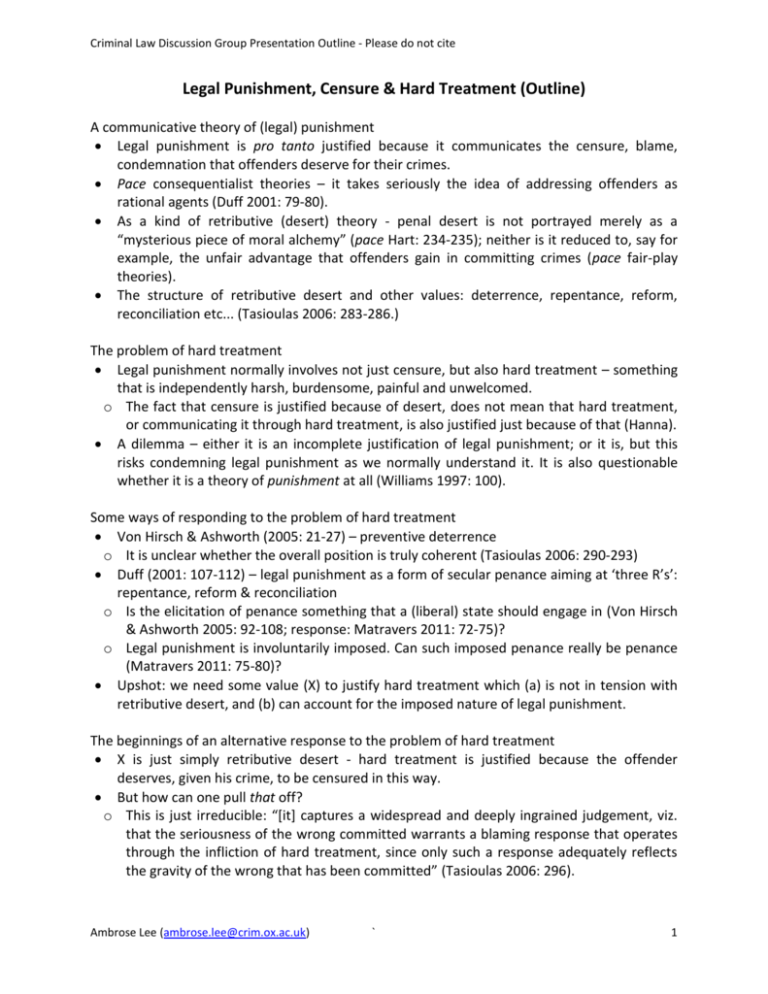
Criminal Law Discussion Group Presentation Outline - Please do not cite Legal Punishment, Censure & Hard Treatment (Outline) A communicative theory of (legal) punishment Legal punishment is pro tanto justified because it communicates the censure, blame, condemnation that offenders deserve for their crimes. Pace consequentialist theories – it takes seriously the idea of addressing offenders as rational agents (Duff 2001: 79-80). As a kind of retributive (desert) theory - penal desert is not portrayed merely as a “mysterious piece of moral alchemy” (pace Hart: 234-235); neither is it reduced to, say for example, the unfair advantage that offenders gain in committing crimes (pace fair-play theories). The structure of retributive desert and other values: deterrence, repentance, reform, reconciliation etc... (Tasioulas 2006: 283-286.) The problem of hard treatment Legal punishment normally involves not just censure, but also hard treatment – something that is independently harsh, burdensome, painful and unwelcomed. o The fact that censure is justified because of desert, does not mean that hard treatment, or communicating it through hard treatment, is also justified just because of that (Hanna). A dilemma – either it is an incomplete justification of legal punishment; or it is, but this risks condemning legal punishment as we normally understand it. It is also questionable whether it is a theory of punishment at all (Williams 1997: 100). Some ways of responding to the problem of hard treatment Von Hirsch & Ashworth (2005: 21-27) – preventive deterrence o It is unclear whether the overall position is truly coherent (Tasioulas 2006: 290-293) Duff (2001: 107-112) – legal punishment as a form of secular penance aiming at ‘three R’s’: repentance, reform & reconciliation o Is the elicitation of penance something that a (liberal) state should engage in (Von Hirsch & Ashworth 2005: 92-108; response: Matravers 2011: 72-75)? o Legal punishment is involuntarily imposed. Can such imposed penance really be penance (Matravers 2011: 75-80)? Upshot: we need some value (X) to justify hard treatment which (a) is not in tension with retributive desert, and (b) can account for the imposed nature of legal punishment. The beginnings of an alternative response to the problem of hard treatment X is just simply retributive desert - hard treatment is justified because the offender deserves, given his crime, to be censured in this way. But how can one pull that off? o This is just irreducible: “[it] captures a widespread and deeply ingrained judgement, viz. that the seriousness of the wrong committed warrants a blaming response that operates through the infliction of hard treatment, since only such a response adequately reflects the gravity of the wrong that has been committed” (Tasioulas 2006: 296). Ambrose Lee (ambrose.lee@crim.ox.ac.uk) ` 1 Criminal Law Discussion Group Presentation Outline - Please do not cite I agree, but still why? Is it not just another “mysterious piece of moral alchemy” (even if, pace Tasioulas (2006: 296-297), we can distinguish it from revenge and vengeance)? Demystifying the retributive desert of hard treatment in a communicative theory of punishment The nature of hard treatment in punishment o It aims to impose suffering (Hanna 2008: 126)? Note quite – we are not talking about medieval torture chambers here. Let’s focus on imprisonment instead. o But what is the nature of imprisonment? It is a form of exclusion, excluded from the (political) community in question. o Understood in this way, it is not that radically different from other non-legal kinds of punishment: school expulsion etc... What about the confinement aspect of imprisonment? (I shall come back to that later) But why is exclusion justified? The nature of censure in punishment o Both defenders and critics use ‘blame’, ‘censure’ and ‘condemnation’ rather interchangeably as varying degrees of moral criticism. Are blame, censure and condemnation just variations in degrees of severity? Condemnation: maybe – a horrific predicament in which one might not get out from. E.g. the bible: “Sinners are condemned to hell (for all eternity)”. Blame and censure: Not quite – censure involves authority. It is a blaming response from a position of authority. Compare – a blaming response from moral equals, e.g. friends, colleagues etc... Is blame just mere moral criticism? Note quite – it seems consistent for me to morally criticise you but not blame you. o What is blame then? Scanlon: “Briefly put, my proposal is this: to claim that a person is blameworthy for an action is to claim that the action shows something about the agent’s attitudes towards others that impairs the relations that others can have with him or her... to blame someone is to hold attitudes towards him that differ, in ways that reflect this impairment, from the attitudes required by the relationship one would otherwise have with the person” (2008: 128 & 145). E.g. friendship – the attitude that Brian is not really my friend anymore because he seriously betrayed me this time, and this is manifested in the ways I then treat him, i.e. not as a friend. Applying this to censure, a blaming response from a position of authority Insofar as someone flouted the norms that govern a community in question, then he deserves to be blamed by the community in question – i.e. the entity with the requisite authority. This attitude consists in, if he has seriously and severely flouted the norms that govern the community in question, that he is not really a member of the community anymore; and this is manifested by excluding him from the community in question. Ambrose Lee (ambrose.lee@crim.ox.ac.uk) ` 2 Criminal Law Discussion Group Presentation Outline - Please do not cite E.g. school expulsion – the thought is that we can apply this to the state and imprisonment as exclusion. But WAIT... there is a catch here (and this relates to the confinement aspect of imprisonment) o Following through with the above argument, it is not imprisonment, but banishment or exile. o An assumption all along: if it is appropriate for me to have that attitude to Brian, then all other things being equal, it is appropriate to treat him in a way that that is suggested by that attitude. But not all cases are all other things equal! E.g. the unconditionality of humanity – even if I hold the attitude that Brian is not really a member of the human community, because he has savagely and repeatedly first raped and then quartered and dismembered a number of people while they were still alive, it does not follow that I may treat him in a way that manifests this attitude, i.e. not treat him as a fellow human being. Part of it is (a) whether as a moral equal, I have the requisite standing to judge or justifiably hold the attitude that he is so evil and wicked such that he is not a member of the human community anymore (unsure about this…); but (b) even if I have it, I nevertheless should treat him as a fellow human being because of his unconditional membership of the human community. Applying this back to state and legal punishment – this (I think) rules out cruel and unusual forms of punishment and capital punishment as permissible forms of legal punishment. Relating all this back to banishment or exile - maybe the same goes for citizenship? No matter how wicked the offender is, the state should nevertheless treat him as a citizen of the political community; and this means, I take it, then he should be afforded the rights that he has, and the protection that he is entitled to, as a citizen. Question: Should the offender be afforded the same set of rights as his fellow citizens? Compare - under English law, prisoners are not allowed to vote. Thus the state should not banish or exile offenders – this is basically just leaving them to fend for themselves. Rather, the state should exclude offenders from the political community in a way that still allows it to effectively protect and afford the rights that offenders are entitled to as citizens. Imprisonment precisely can do just that (well, at least an ideal form of it, not necessary in its current form). Conclusion Back to Tasioulas: “the seriousness of the wrong committed warrants a blaming response that operates through the infliction of hard treatment, since only such a response adequately reflects the gravity of the wrong that has been committed.” True, but not quite as simple as that… Ambrose Lee (ambrose.lee@crim.ox.ac.uk) ` 3 Criminal Law Discussion Group Presentation Outline - Please do not cite o Given that the offender flouted the norms that govern the political community in question, he deserves to be censured, that is, blamed by the political community, i.e. the state. o And this can consist in exclusion, if and only if the crime that is committed by the offender is serious and severe enough (determining what exactly is this is a substantive first order normative question on proportionality) – Cf. school expulsion and de-friending others. o Yet the state cannot merely expel or banish the offender, given the unconditionality of citizenship. – Cf. the unconditionality of humanity. o Thus what the offender deserves is imprisonment. Responding to the problem of hard treatment o Put simply: hard treatment (i.e. imprisonment) is part and parcel of the blame that offenders deserve from the state (qua the political community, the public, the polis etc.), in virtue of the seriousness and severity of their crimes. Two clarificatory points: o There is still something irreducible in this: the offender, in virtue of his wrongdoing, deserves to be blamed in a way that is more substantive than just mere moral criticism. o It is not just a version of the rights forfeiture theory of punishment: the offender has not forfeited his (citizenship) rights in virtue of his wrongdoing. Rather, they are justifiably infringed because and to the extent that he deserves to be censured, e.g. imprisoned. References Ashworth, Andrew & Von Hirsch, Andrew (2005) Proportionate Sentencing, Oxford: Oxford University Press. Duff, Antony (2001) Punishment, Communication, and Community, New York: Oxford University Press. Hanna, Nathan (2008) “Say What? A Critique of Expressive Retributivism”, Law and Philosophy 27: 123-150. Hart, H.L.A. (1968) Punishment and Responsibility, Oxford: Oxford University Press. Matravers, Matt (2011) “Duff on Hard Treatment”, in Rowan Cruft, Matthew Kramer & Mark Reiff (eds.) Crime, Punishment and Responsibility, Oxford, New York: Oxford University Press, pp. 69-82. Scanlon, Thomas (2008) Moral Dimensions: Permissibility, Meaning, Blame, Mass.: Belknap Press of Harvard University Press. Tasioulas, John (2006) “Punishment and Repentance”, Philosophy 81 (2): 279-322. Williams, Bernard (1997) “Moral Responsibility and Political Freedom”, Cambridge Law Journal 56: 96-102. Ambrose Lee (ambrose.lee@crim.ox.ac.uk) ` 4


